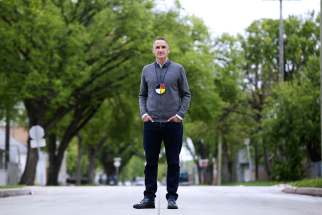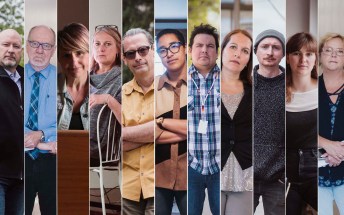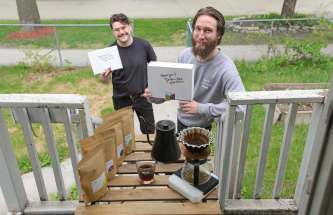Courage to speak, mission to help Activist, business leader and former MLA Kevin Chief opens up about his 18 years of sobriety, the reason he kept his struggle with alcohol a secret and his desire to help others in the Indigenous community
Read this article for free:
or
Already have an account? Log in here »
To continue reading, please subscribe:
Monthly Digital Subscription
$0 for the first 4 weeks*
- Enjoy unlimited reading on winnipegfreepress.com
- Read the E-Edition, our digital replica newspaper
- Access News Break, our award-winning app
- Play interactive puzzles
*No charge for 4 weeks then price increases to the regular rate of $19.95 plus GST every four weeks. Offer available to new and qualified returning subscribers only. Cancel any time.
Monthly Digital Subscription
$4.99/week*
- Enjoy unlimited reading on winnipegfreepress.com
- Read the E-Edition, our digital replica newspaper
- Access News Break, our award-winning app
- Play interactive puzzles
*Billed as $19.95 plus GST every four weeks. Cancel any time.
To continue reading, please subscribe:
Add Free Press access to your Brandon Sun subscription for only an additional
$1 for the first 4 weeks*
*Your next subscription payment will increase by $1.00 and you will be charged $16.99 plus GST for four weeks. After four weeks, your payment will increase to $23.99 plus GST every four weeks.
Read unlimited articles for free today:
or
Already have an account? Log in here »
Hey there, time traveller!
This article was published 29/05/2020 (2050 days ago), so information in it may no longer be current.
Every day starts and ends with a prayer.
In the morning, Kevin Chief asks for the strength and courage to stay sober. At night, he thanks the Creator for another day of sobriety. It’s been 18 years since his last drink. Staying sober is still the most important thing to him.
“You’d have to be pretty close to me to know. And there are people today who know me very well that don’t know,” the 45-year-old father of three says.
“I never meant it to be like that. The anonymity was important to me because I honestly thought I wouldn’t make it, and I thought it’d be embarrassing when I slipped again. So I thought it was better for me to not let people know. And then my sponsor told me, ‘Look, you’ll know when the time’s right. You don’t need to force it.’”
● ● ●

The right time arrives in early March, shortly before the COVID-19 pandemic hits, when Chief stands at the front of a packed portable building on the grounds of Headingley Correctional Centre.
The men’s faces looking back at him seem so young. It strikes him that most are Indigenous. He already knows the stats — that nearly three-quarters of the population behind bars in Manitoba is Indigenous — but it feels overwhelming to see so many who look like him sitting here as inmates.
And it makes what he’s about to say that much more important.
As a community activist, former politician and respected businessman, countless speaking engagements over the years have taught Chief he can’t talk about the Indigenous experience in Winnipeg, or the intergenerational trauma, without talking about poverty and alcohol.
Usually, he tells audiences about his father, Norman Chief, who attended Indian Day School in Duck Bay, raised Kevin as a single dad and died from the effects of years of alcoholism when Kevin was 18.
Standing in front of those men, he’s more nervous to speak than he ever was during question period in Manitoba’s legislature.
“I used my dad’s story like I always do,” Chief says more than two months later, reflecting with some relief on his pre-pandemic visit to Headingley.
But for the first time, he goes further.
“I used that as a way to build confidence for myself to get into my own story.”
● ● ●

It’s a story he’s now ready to tell beyond the walls of the jail, hoping what he has to say will help others the same way so many other people’s stories have helped him.
“I’ve said this thousands of times, and it’ll be the first time I say it to anyone publicly, but you know, my name’s Kevin and I’m an alcoholic.”
Chief states this purposefully, as if he’s been planning to say it. To some extent, he has been: using his voice to help others — particularly kids who grew up poor in Winnipeg’s North End like he did — has been a constant in Chief’s career. He’s been wondering whether he could have done more to help by speaking up sooner, a question that has come to the forefront for him during the pandemic.

Chief went from attending the University of Winnipeg on a basketball scholarship to becoming an all-star athlete who founded the Winnipeg Aboriginal Sport Achievement Centre and started a day camp and other programs for inner-city youth. After six years as the MLA for Point Douglas — four of them as a cabinet minister in Greg Selinger’s NDP government — Chief left politics nearly four years ago and went on to serve as vice-president of the Business Council of Manitoba. Now, he has his own company and continues to do community-development work in Winnipeg.
There were so many people along the way who “made it impossible for me not to have success,” as Chief puts it. He never wanted to disappoint them by bringing up his struggle with alcohol.
“Especially when I was in politics, but even now, I don’t want to let people down. I don’t want to feed a stereotype,” he says. He tears up, clears his throat and continues on.
“But I can’t ask people that I love and care about to do something that I’m not prepared to do myself, and I know how important it is for people to reach out and ask for help. I know how important it is to have a conversation about really difficult stuff.”
● ● ●
The men in Headingley’s Winding River Program lean in closer, listening as Chief speaks.
He tells them about one morning, four years after his dad died on March 25, 1993, when he woke up to hear an old Freddy Fender tune, sad country music like his dad used to sing. A friend was sitting at the kitchen table with the cassette player on and a beer in hand, beckoning him to sit and have a drink.
“We were drinking all night. I had never got up in the morning and drank right away. I had never done it, but my dad used to do it all the time,” Chief explains, later repeating the story to a reporter.

“It felt so good to do that, and I realized how much I missed my dad. And that started me on a journey of heavy drinking, of heavy binge drinking.”
Some of the men — inmates as well as guards — nod in recognition. Later, they’ll offer hugs and handshakes while telling him his story sounds so much like their own.
As Chief talks about his family alongside a slideshow presentation of his old photos, one inmate sees himself pictured on the little screen.
Seated by the trays of bannock dogs and Rice Krispies squares he helped prepare in the jail’s kitchen, Brian Chief looks up at his uncle.
“I always looked up to my uncle growing up. He’s like a big brother to me,” the 39-year-old says on the phone from jail a couple of months later.
He’s awaiting sentencing on armed-robbery charges stemming from an incident in the Talbot-Grey neighbourhood in 2018.
“I always wanted to be him. Like when I was younger, I’d wear his clothes. I’d shoot (a basketball) around and pretend I was him.” – Brian Chief
“I’d like to tell you the story of what happened, but I’m still going through court,” he says, making one thing clear: “If not for those charges, I would be on the street using drugs.”
In the 27 months since Chief’s nephew was arrested, he’s completed the Winding River addictions treatment program and is considered a mentor in his unit. He’s given tours of the place to judges, and he’s the one who sparked the idea for his uncle’s visit, after seeking his input on the path to sobriety.
Brian, who is about six years younger than his uncle, used to live with him and his dad at their place on Burrows Avenue.
“I always wanted to be him. Like when I was younger, I’d wear his clothes. I’d shoot (a basketball) around and pretend I was him,” he says.

The boys already had near-matching personalities: both shy at first, but warm and outgoing in a crowd. They rode bicycles together around the neighbourhood, played pickup basketball games, worked together and, eventually, drank together.
“I’ve been dealing with alcohol since I was a young kid… 12, 13 years old,” Brian says. He was in junior high when Kevin went to university, scouted from Tec Voc to play ball when no one in their family had graduated from high school.
Kevin says basketball saved his life; nothing else set him apart from the other kids in the neighbourhood.
“The difference with me was, it was easier for people to see the potential in me ‘cause I could shoot a basketball,” he says. “But that potential’s in every person.”
“The difference with me was, it was easier for people to see the potential in me ‘cause I could shoot a basketball.” – Kevin Chief
By the time Kevin quit drinking, Brian was into cocaine.
“It’s been a struggle for us, there was always alcohol,” Brian says. “He made a good choice in life and he did really well, but he also struggled too…. From where we (were) to now, it’s very good, like he did very well, and I’m hoping to get on that same path.”
With 27 months of sobriety under his belt now, Brian says he’s learned it helps him to help those around him. He says he’s trying to arrange jobs for some of the guys who are about to be released, and he tells others it’s OK to ask for help.
“I’ve been given an opportunity, man. I’m not dead. I’m still alive, and I’m going to try and make the most of my life now, and try and help other people.”
● ● ●

When they talk, exclusively over the phone now that jail visits have been put on hold by the pandemic, Kevin tells his nephew three things that have helped him most to stay sober over the years.
The first lesson is what works for you may not work for someone else, but there’s something out there for everyone. “I deeply believe that,” Chief says. For him, a 12-step program helped, followed by getting involved in Indigenous cultural traditions and finding ways to serve in the community.
No. 2: you’re not on this journey alone.
The third, “and this is the most critical one to me, is how much hope I took from people’s stories.”
Those stories are what got him through, and why he’s telling his now.
On the ninth anniversary of his father’s death, Kevin went to his first Alcoholics Anonymous meeting, thanks to the urging of a childhood friend.
At the end of a rough binge-drinking session back in March 2002, hungover and shaking, Chief called up Chris Henderson.
“I think he was taking that lifestyle to extremes and I could definitely hear it in his voice that it was starting to get the better of him,” recalls Henderson, now 48.
“I don’t underestimate the power of a story. I mean, that’s what got me through those hard weekends of staying sober.” – Kevin Chief
A few years older than Chief, Henderson had been sober about a year then. Growing up in the same neighbourhood, they became friends early on. Even as a kid, Chief showed some of the same leadership qualities that helped him as an advocate and politician.
“If anything, he was an organizer, always trying to get kids together to play sports,” Henderson says. “He’s always been a social animal, always wanting to meet and talk with people.”
As young men about to start careers, they both liked to have a good time, and for years drinking was part of that, for both of them. Too much a part, Henderson later realized.
“During those times, I could tell he was still… still having too much of a good time at the expense of his well-being.”
That day on the phone, he told Chief he might need to make a change.

The date of that first AA meeting, despite its significance to Chief because of his late father, was a coincidence. He waited two days after that phone call so he’d have a bit of time to recuperate from the heavy drinking. He’d tried before to quit, and hadn’t been able to do it on his own, so he was nervous.
Looking back now, Chief says he’s grateful to Henderson for showing him the way. Listening to other people share in those meetings, he says, kept him from giving up.
“I don’t underestimate the power of a story. I mean, that’s what got me through those hard weekends of staying sober,” he says. Soon, he was living for other people’s “sobriety birthdays,” and would show up at any AA meeting he could find, just so he could hear someone mark the time since their last drink with a story about how they’d managed for three months, a year, 10 years. He once went to 90 meetings in 90 days.
“I’d be all over the city trying to be like, ‘Hey, is there a birthday? When’s your birthday?’” he recalls, smiling at the memory of his own eagerness.
“And then I’d hear a story and it would be like, ‘I’m good,’ Chief adds, heaving a sigh of relief to demonstrate. “I can get through this weekend. And then one weekend turned to two, and all of a sudden I had a month, and then I had three months, and then — oh, my God — I couldn’t believe I had been sober for a year.”
● ● ●
In this time of so much uncertainty, Chief says he’s been thinking about drinking more than he ever has before.
“Obviously, because I’m praying for sobriety, but with so much anxiety and worry, I gotta tell you, the (temptation) to just be able to take a day off and be able to drink is there. But what’s giving me strength and hope is my conversations that I have with my nephew. It’s keeping me strong and resilient.”
He says addiction is a funny thing — it plays with your mind, makes you remember only the good stuff, not the hurt or the heartache.
Talking about it has helped.
“I had a real public platform to do this, and… I wish I would’ve done this earlier. Because there’s a lot of people in my neighbourhood that were struggling and continue to struggle with the things I (was), and I wish I would have done it sooner,” he says. “When I started talking to my nephew, it was a reminder that you can’t live a life of regret, but you can do something about it today.
“So here we are.”
katie.may@freepress.mb.ca
Twitter: @thatkatiemay

Katie May is a multimedia producer for the Free Press.
Our newsroom depends on a growing audience of readers to power our journalism. If you are not a paid reader, please consider becoming a subscriber.
Our newsroom depends on its audience of readers to power our journalism. Thank you for your support.
History
Updated on Saturday, May 30, 2020 12:07 PM CDT: Adds comma






